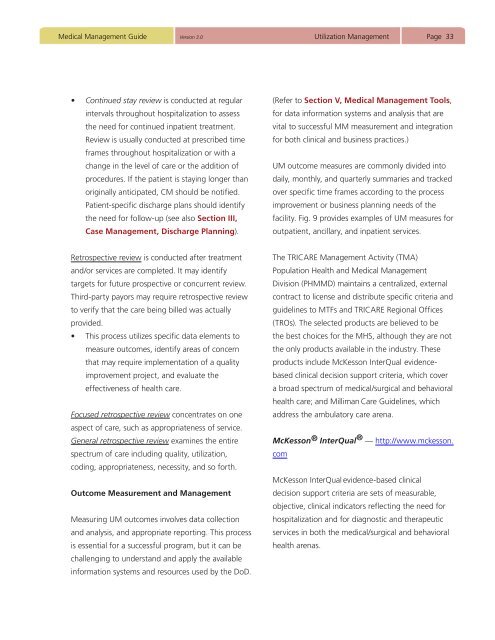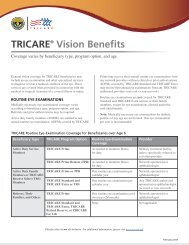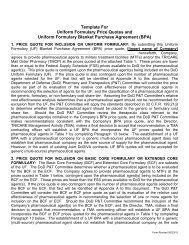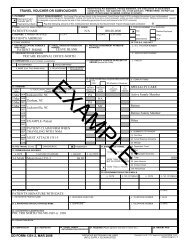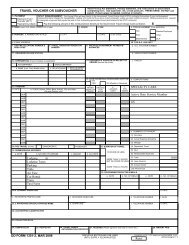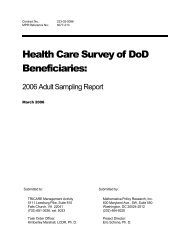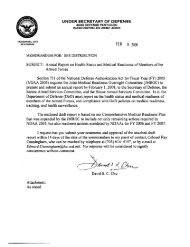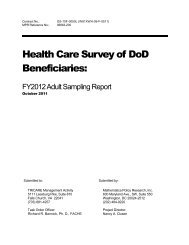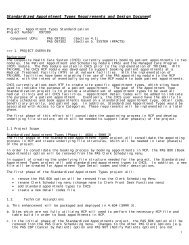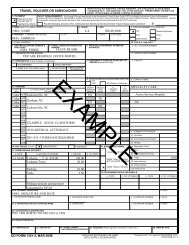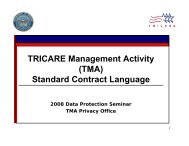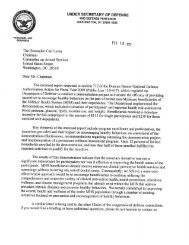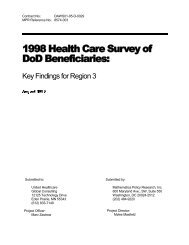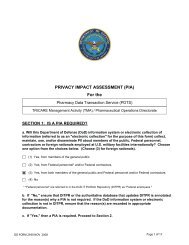Medical Management Guide, 2009, Version 3.0 - Tricare
Medical Management Guide, 2009, Version 3.0 - Tricare
Medical Management Guide, 2009, Version 3.0 - Tricare
- No tags were found...
You also want an ePaper? Increase the reach of your titles
YUMPU automatically turns print PDFs into web optimized ePapers that Google loves.
<strong>Medical</strong> <strong>Management</strong> <strong>Guide</strong><strong>Version</strong> <strong>3.0</strong>Utilization <strong>Management</strong>Page 33• Continued stay review is conducted at regularintervals throughout hospitalization to assessthe need for continued inpatient treatment.Review is usually conducted at prescribed timeframes throughout hospitalization or with achange in the level of care or the addition ofprocedures. If the patient is staying longer thanoriginally anticipated, CM should be notified.Patient-specific discharge plans should identifythe need for follow-up (see also Section III,Case <strong>Management</strong>, Discharge Planning).(Refer to Section V, <strong>Medical</strong> <strong>Management</strong> Tools,for data information systems and analysis that arevital to successful MM measurement and integrationfor both clinical and business practices.)UM outcome measures are commonly divided intodaily, monthly, and quarterly summaries and trackedover specific time frames according to the processimprovement or business planning needs of thefacility. Fig. 9 provides examples of UM measures foroutpatient, ancillary, and inpatient services.Retrospective review is conducted after treatmentand/or services are completed. It may identifytargets for future prospective or concurrent review.Third-party payors may require retrospective reviewto verify that the care being billed was actuallyprovided.• This process utilizes specific data elements tomeasure outcomes, identify areas of concernthat may require implementation of a qualityimprovement project, and evaluate theeffectiveness of health care.Focused retrospective review concentrates on oneaspect of care, such as appropriateness of service.General retrospective review examines the entirespectrum of care including quality, utilization,coding, appropriateness, necessity, and so forth.Outcome Measurement and <strong>Management</strong>Measuring UM outcomes involves data collectionand analysis, and appropriate reporting. This processis essential for a successful program, but it can bechallenging to understand and apply the availableinformation systems and resources used by the DoD.The TRICARE <strong>Management</strong> Activity (TMA)Population Health and <strong>Medical</strong> <strong>Management</strong>Division (PHMMD) maintains a centralized, externalcontract to license and distribute specific criteria andguidelines to MTFs and TRICARE Regional Offices(TROs). The selected products are believed to bethe best choices for the MHS, although they are notthe only products available in the industry. Theseproducts include McKesson InterQual evidencebasedclinical decision support criteria, which covera broad spectrum of medical/surgical and behavioralhealth care; and Milliman Care <strong>Guide</strong>lines, whichaddress the ambulatory care arena.McKesson ® InterQual ® — http://www.mckesson.comMcKesson InterQual evidence-based clinicaldecision support criteria are sets of measurable,objective, clinical indicators reflecting the need forhospitalization and for diagnostic and therapeuticservices in both the medical/surgical and behavioralhealth arenas.


